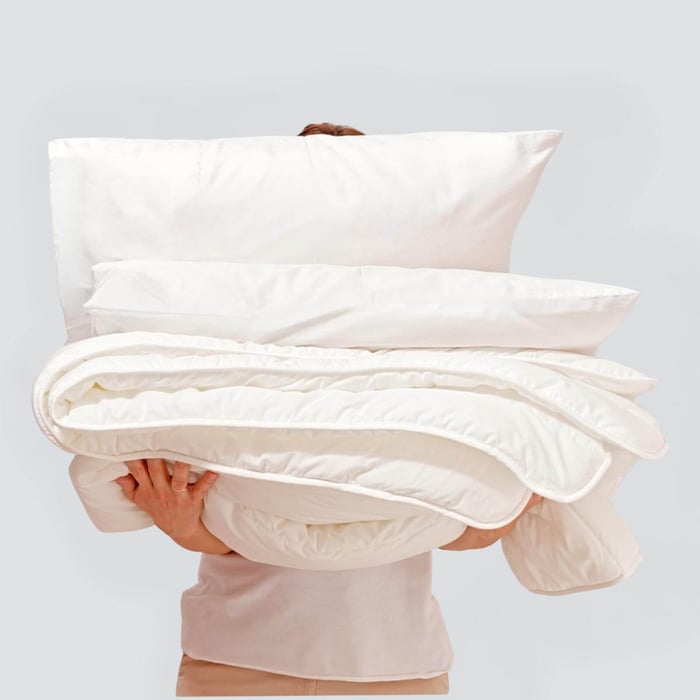Table of Contents
How a Wool Comforter Transformed My Sleep — and Ended My Tossing and Turning
A wool comforter wasn’t even on my radar. I thought sleep was just… sleep — you lie down, you wake up groggy, and reach for coffee. That was my rhythm.
But the nights kept stretching longer. My mind wouldn’t switch off, and my body couldn’t decide whether it was freezing or on fire. I’d wake tangled, sweaty, and annoyed, convinced that this restless, half-awake state was just how adult sleep worked.
It turns out, I was wrong. The real problem wasn’t stress or screens — it was what I was sleeping under. Once I switched to a wool comforter for better sleep, everything changed.
The Breaking Point: Too Hot, Too Cold, Never Comfortable
Every night felt like a negotiation between comfort and chaos. I’d kick the blanket off, then pull it back up. I’d wake up clammy, then shiver ten minutes later. I blamed hormones, stress, screens — anything except the obvious: the comforter itself.
One night, after waking up again at 3 a.m. with my shirt sticking to my back, I Googled: “Why am I overheating at night?”
That search led me down a rabbit hole — and eventually, to wool.
Organic Wool Comforter | Made in New Zealand, Breathable All-Season Comfort

$342.00
$380.00
Sleep naturally better with our organic wool comforter Unlike down or synthetic comforters that trap heat, our spun wool design wicks away moisture and prevents overheating, so you stay cool & dry. Designed for deeper sleep with a gentle weight… Read more
The Surprise: Wool Isn’t What You Think It Is
Like most people, I thought wool was thick and wintery — something you’d pull out for snow days, not for sleep. But I learned that high-quality, organic wool is one of nature’s most active fibers. It adapts. It breathes. It regulates your body temperature like a living thing.
The shocker? Most of the “cozy” comforters I’d been buying weren’t cozy at all. They were filled with microfiber — basically spun plastic.
I was literally sleeping under something that trapped heat and moisture like a raincoat. No wonder my sleep was suffocating.
So I made the switch — an organic, temperature-regulating wool comforter, made from natural fibers that actually let my body breathe.
The First Night: Still, Quiet, Different
The difference was subtle but undeniable.
That first night, I noticed I didn’t toss or kick the blanket off once. My body just... settled. The air under the comforter stayed balanced — warm but never stifling. I wasn’t drenched, I wasn’t chilled, and for the first time in ages, I woke up without that heavy, foggy feeling.
It was like my body had been waiting for permission to rest.
The texture surprised me too — soft, grounding, with a gentle weight that somehow felt secure. Not heavy, but comforting. Like a deep exhale.
 Regenerative Organic Wool Comforter by Antipodean Home
Regenerative Organic Wool Comforter by Antipodean HomeThe Gentle Weight of Calm
One of the first things I noticed about a wool comforter is the way it rests on you — not pressing down, but embracing you with quiet reassurance. The natural drape gives a sense of safety, almost like a soft, breathable hug. That gentle, balanced weight helps signal to your body that it’s safe to let go.
Sleep specialists often talk about deep pressure stimulation — the feeling of being lightly held, which can calm the nervous system and ease anxiety. I didn’t know that at the time, but I felt it. My breath slowed. My muscles loosened. It was as if my brain finally got the message: you can stop now.
That comforting pressure helps me fall asleep faster, and stay asleep longer. There’s a grounded feeling — a quiet sense of being anchored — that makes drifting off almost effortless.
Organic Wool Duvet Insert & Bedding Set | Sustainable & Regenerative | Made in New Zealand

$475.15
$559.00
Cooler Nights & Deeper Sleep — All Year Long Looking for the perfect organic wool duvet insert and wool bedding set? This complete bundle includes both the duvet insert and cover. (The insert uses the same breathable, temperature-regulating design as… Read more
As the nights went on, I realized the calm I felt wasn’t just physical — it was emotional. There’s something grounding about knowing that what keeps you warm also restores the world it comes from. My comforter wasn’t just helping me sleep; it was part of a regenerative cycle, made from wool that gives back to the land it’s grown on. Somehow, that awareness made the rest feel deeper, more meaningful — as if both my body and the planet could finally exhale together.
The more I learned, the more it made sense. When your body doesn’t have to battle heat or humidity, your heart rate slows and your sleep cycles deepen. Wool’s natural ability to regulate microclimate — the air and moisture between you and the bedding — keeps your temperature stable, allowing for more consistent REM and deeper slow-wave sleep. I wasn’t just sleeping longer; I was sleeping better.
The Weeks That Followed: My Sleep Reset Itself
Over the next few weeks, the changes added up.
I fell asleep faster.
I woke up fewer times.
I didn’t wake in a pool of sweat.
And somehow, mornings felt lighter.
That endless loop of exhaustion and caffeine started to fade. My body felt calmer at night, and I woke up actually ready to move. It wasn’t just about comfort — it was about my nervous system finally relaxing.
What Makes Wool So Different
Now, I understand why it worked. Wool is nature’s built-in sleep tech:
✔ Temperature-Regulating — keeps you warm when it’s cold, cool when it’s hot.
✔ Moisture-Wicking — draws away humidity before it becomes sweat.
✔ Hypoallergenic — naturally resists dust mites and mold.
✔ Sustainable & Regenerative — sourced from renewable New Zealand farms that restore soil and biodiversity.
It’s not magic — it’s biology. Wool works with your body’s rhythms instead of against them.
If you’re curious what makes a good one, here’s how to choose the best wool comforter for your sleep style.
| Why Wool Comforters Are Worth Considering If you’re on the fence, here’s why a wool comforter might be the missing piece in your sleep routine: |
|---|
| ✔ Temperature-Regulating Comforter – Keeps you warm when it’s cold and cool when it’s hot. ✔ Moisture-Wicking Comforter – Absorbs excess humidity, so you don’t wake up sweating. ✔ Hypoallergenic Wool Comforter – Naturally resistant to dust mites and mold, perfect for sensitive skin. ✔ Breathable Wool Comforter – No more overheating or feeling suffocated under heavy blankets. ✔ Sustainable Wool Comforter – Wool is biodegradable and sourced from renewable materials. |
Better Sleep Starts with Nature
If you’re struggling with restless nights, it might not be stress or screens. It might be what’s covering you.
For me, switching to a wool comforter for better sleep wasn’t just an upgrade — it was a reset. The difference between getting sleep and being restored.
Because when your bedding breathes, so do you.
While personal stories show the life-changing results of better sleep, you can explore the mechanical science behind how our fibers stop the 'toss and turn' cycle in our master guide to Wool Comforters & Wool Duvets.
If you’ve ever had those nights where you feel like sleep just won’t come, or if you’re constantly waking up feeling less rested than you should, maybe it’s time to try something simple—like upgrading your comforter. The right bedding can make all the difference, helping to regulate temperature, wick away moisture, and keep you comfortably asleep through the night.
Sometimes, the solution isn’t about fixing your sleep but creating the right conditions for better rest. A breathable, natural wool comforter works with your body, not against it, so you’re not overheating one minute and freezing the next. And for me, that change started with wool.
Ready to find your own sleep solution? Browse our Wool Comforter Collection to find the perfect weight for your restorative rest.
Ready to find your own? Learn exactly what to look for in the best wool comforter before you buy. How to choose the best wool comforter
FAQs on Wool Duvet Inserts, Comforters & Sustainable Bedding
Are wool comforters good for hot sleepers?
Yes. Wool naturally wicks away heat and moisture, helping your body regulate temperature. That makes wool comforters especially effective for hot sleepers and anyone who struggles with night sweats.
What makes a wool comforter better than synthetic alternatives?
Unlike synthetics that trap heat, wool fibers allow airflow while absorbing and releasing moisture. This keeps you cool in summer, cozy in winter, and comfortable year-round.
Are wool comforters hypoallergenic?
High-quality organic wool comforters are naturally hypoallergenic. They resist dust mites, mold, and bacteria without the need for chemical treatments, making them a great choice for sensitive sleepers.
How long does a wool comforter last?
With proper care, a wool comforter can last over a decade. Its natural resilience means it won’t clump or flatten like down or polyester alternatives.
Do wool comforters feel heavy or bulky?
Not at all. Modern wool comforters, especially with designs like Airlay, are lightweight yet warm. They feel breathable and cloud-like instead of heavy.
Does the gentle weight of a wool comforter really help you sleep better?
Yes. The gentle, even weight of a wool comforter can have a calming effect that helps you fall asleep faster and stay asleep longer.
According to the Sleep Foundation, gentle pressure — similar to that created by weighted blankets — can trigger deep pressure stimulation, which reduces anxiety and promotes relaxation. This helps slow your heart rate, release serotonin and melatonin, and improve overall sleep quality.
Unlike heavy synthetic fills, natural wool provides this balanced, soothing weight while remaining breathable and temperature-regulating — so you get that comforting “hug” feeling without overheating.




